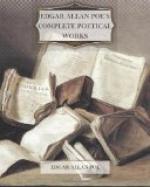Of her bright face one glance will trace
A picture on the brain,
And of her voice in echoing hearts
A sound must long remain;
But memory, such as mine of her,
So very much endears,
When death is nigh my latest sigh
Will not be life’s,
but hers.
I fill’d this cup to one made up
Of loveliness alone,
A woman, of her gentle sex
The seeming paragon—
Her health! and would on earth there stood,
Some more of such a frame,
That life might be all poetry,
And weariness a name.
It was the misfortune of Mr. Pinkney to have been born too far south. Had he been a New Englander, it is probable that he would have been ranked as the first of American lyrists by that magnanimous cabal which has so long controlled the destinies of American Letters, in conducting the thing called ‘The North American Review’. The poem just cited is especially beautiful; but the poetic elevation which it induces we must refer chiefly to our sympathy in the poet’s enthusiasm. We pardon his hyperboles for the evident earnestness with which they are uttered.
It was by no means my design, however, to expatiate upon the merits of what I should read you. These will necessarily speak for themselves. Boccalina, in his ‘Advertisements from Parnassus’, tells us that Zoilus once presented Apollo a very caustic criticism upon a very admirable book:—whereupon the god asked him for the beauties of the work. He replied that he only busied himself about the errors. On hearing this, Apollo, handing him a sack of unwinnowed wheat, bade him pick out all the chaff for his reward.
Now this fable answers very well as a hit at the critics—but I am by no means sure that the god was in the right. I am by no means certain that the true limits of the critical duty are not grossly misunderstood. Excellence, in a poem especially, may be considered in the light of an axiom, which need only be properly put, to become self-evident. It is not excellence if it require to be demonstrated its such:—and thus to point out too particularly the merits of a work of Art, is to admit that they are not merits altogether.
Among the “Melodies” of Thomas Moore is one whose distinguished character as a poem proper seems to have been singularly left out of view. I allude to his lines beginning—“Come, rest in this bosom.” The intense energy of their expression is not surpassed by anything in Byron. There are two of the lines in which a sentiment is conveyed that embodies the all in all of the divine passion of Love—a sentiment which, perhaps, has found its echo in more, and in more passionate, human hearts that any other single sentiment ever embodied in words:
Come, rest in this bosom, my own stricken
deer,
Though the herd have fled from thee, thy
home is still here;
Here still is the smile, that no cloud
can o’ercast,
And a heart and a hand all thy own to
the last.




